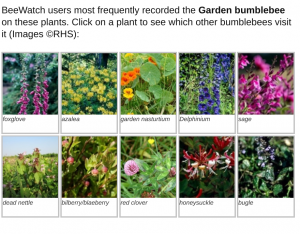News Story
Citizen science data reveals the need for keeping pollinator-friendly plant lists up-to-date
Tuesday 24 Nov 2020
Our latest paper from BeeWatch Planting for Pollinators citizen science data has just been published in Nature Scientific Reports.
Widespread concern over declines in pollinating insects has led to numerous recommendations of which “pollinator-friendly” plants to grow and help turn urban environments into valuable habitat for such important wildlife. We used data gathered through our UK-wide citizen science programme (BeeWatch) to determine food plant use by the nations’ bumblebee species, and show that much of the plant use recorded does not reflect practitioner recommendations. Whilst communicated widely by organisations and readily taken up by gardeners, “pollinator-friendly” lists fail to recognise the stark differences among species and pollinator groups, or adapt to changing phenology or gardening practices. Our paper calls for the provision and use of up-to-date dynamic planting recommendations driven by live (citizen science) data to support pollinator-friendly management of garden spaces, and in the process transformative personal learning journeys through gardening.
The research was partially funded through the ongoing EPSRC Grant "Human-computer collaborative learning in citizen science" (EP/S027513/1). Principal Investigator Advaith Siddharthan said:
"Planting for Pollinators pioneered the use of AI technologies such as Recommender Systems in Citizen Science projects to offer data-driven pollinator-friendly gardening advice, and previously demonstrated its value in bringing about attitudinal change in citizens (Sharma et al. 2019). This paper additionally demonstrates the scientific value of the data collected through citizen science."
To find out more, read the paper below:
Citizen science data reveals the need for keeping garden plant recommendations up-to-date to help pollinators (2020) Helen B Anderson, Annie Robinson, Advaith Siddharthan, Nirwan Sharma, Helen Bostock, Andrew Salisbury, Stuart Roberts and René van der Wal. Scientific Reports volume 10, Article number: 20483
https://www.nature.com/articles/s41598-020-77537-6
Latest News
OU Vice-Chancellor visits KMi: A showcase of Innovation and Impact
Explainable AI study on Education Equity awarded Best Paper at ICAITE 2025
ClimateSense team wins top places in two international misinformation challenges
Assessing the Impact of Artificial Intelligence on the Gender Pay Gap
PhD Awarded for Groundbreaking Research on Game-Based Cyber Security Training

